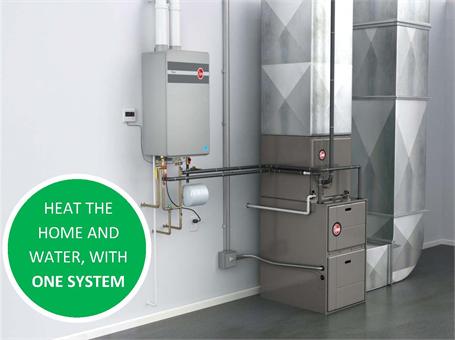Rumored Buzz on The Maintenance Requirements for a Tank vs. a Tankless Water Heater

Deciding on the ideal type of water heating system for your property can be a daunting task. With thus several possibilities on call, it's necessary to think about your demands and inclinations prior to helping make a decision. In this article, we'll cover the various types of water heating systems on call and aid you determine which one is correct for you.
1. Storage Tank Water Heaters
Storing container water heaters are the very most usual style of water heating system located in houses. They consist of a large tank that stash very hot water until it's needed. These containers commonly range in dimension from 20 to 80 quarts and are warmed through either gasoline or electricity.
While storing storage tank water heating systems are fairly low-cost to buy and mount, they have some disadvantages. To begin with, they take up a great deal of space and might not be suited for tiny homes or apartment or condos. Also, they can squander energy by regularly heating water that may not be made use of for hrs or even days.
2. Tankless Water Heaters
Tankless water heating units, also recognized as on-demand water heating systems, heat energy water as it streams via the unit instead than saving it in a container. They're typically powered by gasoline or electricity and can easily offer an unlimited supply of hot water.

One primary perk of tankless water heating systems is their space-saving layout. They're a lot smaller sized than storing container versions and can easily be positioned on walls or mounted in tight rooms like storage rooms or cupboards.
Nonetheless, tankless versions have a tendency to be more pricey upfront reviewed to storage space storage tanks. In addition, they may call for added adjustments to your home's plumbing system unit because they require much higher flow fees to heat the same quantity of warm water as a storing tank model.
3. Heat Pump Water Heaters
Heat energy pump water heating units work by moving heat energy from the sky or ground right into the device's storing storage tank to heat the water within. They're astonishingly efficient since they use electrical power simply to move warmth instead than produce it straight like traditional power styles.
While warmth pump styles set you back even more upfront than storage tanks, they may conserve house owners up to 50% on their water home heating expenses over opportunity. They're also extra environmentally friendly since they don't count on fossil gas like gas-powered versions.
Nonetheless, warmth pump styles need a bigger room than storage containers and may not be ideal for little houses or condos. They also tend to take longer to warm water matched up to other types of heating systems, which might be a disadvantage for some individuals.
4. Solar Water Heaters
Photo voltaic water heating units count on the sun's electricity to warm water rather than electric power or fuel. They are made up of photo voltaic enthusiasts that are mounted on your roof covering and a storage space tank that save the heated water until it's required.
While Tankless water heater cost analysis can be pricey upfront, they're exceptionally energy-efficient and can easily spare homeowners a considerable amount of money in the lengthy run. In addition, a lot of states provide income tax incentives or reimbursements for house owners who install photo voltaic water heating units.
However, sunlight versions may not be suitable for all environments since they call for direct sun light to work properly. Additionally, they may require additional backup units like power or gas-powered heating systems in the course of time frames of low sun light or high need.
5. Condensing Water Heaters
Condensing water heating systems are identical to standard storage space storage tank models but possess an included feature that bounces back rubbish warm coming from exhaust gases before they leave behind the system. This creates them considerably a lot more effective than standard gas-powered versions since they use a lot less gas to create hot water.
While condensing versions usually tend to cost even more upfront than traditional gas-powered tanks, their performance can save individuals hundreds of dollars each year in electrical expenses.
Nevertheless, shrinking versions call for a larger room than conventional containers and might not be appropriate for tiny houses or houses with limited space for setup.
Final Thoughts
Selecting the correct type of water heating unit relies on your demands and preferences as properly as your finances and home's infrastructure. Think about aspects such as on call room, energy effectiveness rankings, and setup requirements before creating a decision.
Through taking the opportunity to research and match up various models, you can find a water heater that satisfies your requirements and supplies dependable hot water for years to come.
